Xiaomi Mijia BLE Sensors
The xiaomi_ble sensor platform lets you track the output of Xiaomi Bluetooth Low Energy devices using the ESP32 Bluetooth Low Energy Tracker Hub. This component will track, for example, the temperature, humidity, moisture, conductivity, illuminance, formaldehyde, mosquito tablet and battery level of the device every time the sensor sends out a BLE broadcast. Contrary to other implementations, xiaomi_ble listens passively to advertisement packets and does not pair with the device. Hence ESPHome has no impact on battery life. Thus, if you only use such sensors, you can safely set scan_parameters.active: false in esp32_ble_tracker configuration, to save from spamming your RF environment with useless scan requests.
ℹ️ Note
You may alternatively use ESPHome’s Bluetooth Proxy component to forward sensor data to Home Assistant and have Mija devices configured using its own Mija BLE component. This should work for the devices flashed with PVVX MiThermometer custom firmware, as well as the regular, stock firmware.
Supported Devices
HHCCJCY01
MiFlora, Huahuacaocao, measures temperature, moisture, ambient light and nutrient levels in the soil.

Configuration example:
sensor:
- platform: xiaomi_hhccjcy01
mac_address: XX:XX:XX:XX:XX:XX
temperature:
name: "Xiaomi HHCCJCY01 Temperature"
moisture:
name: "Xiaomi HHCCJCY01 Moisture"
illuminance:
name: "Xiaomi HHCCJCY01 Illuminance"
conductivity:
name: "Xiaomi HHCCJCY01 Soil Conductivity"
battery_level:
name: "Xiaomi HHCCJCY01 Battery Level"ℹ️ Note
Newer versions of HHCCJCY01 ship with firmware 3.2.1, and they don’t send the battery level data anymore.
GCLS002
VegTrug Grow Care Garden, Takasho, suitable for outside, similar to the MiFlora.
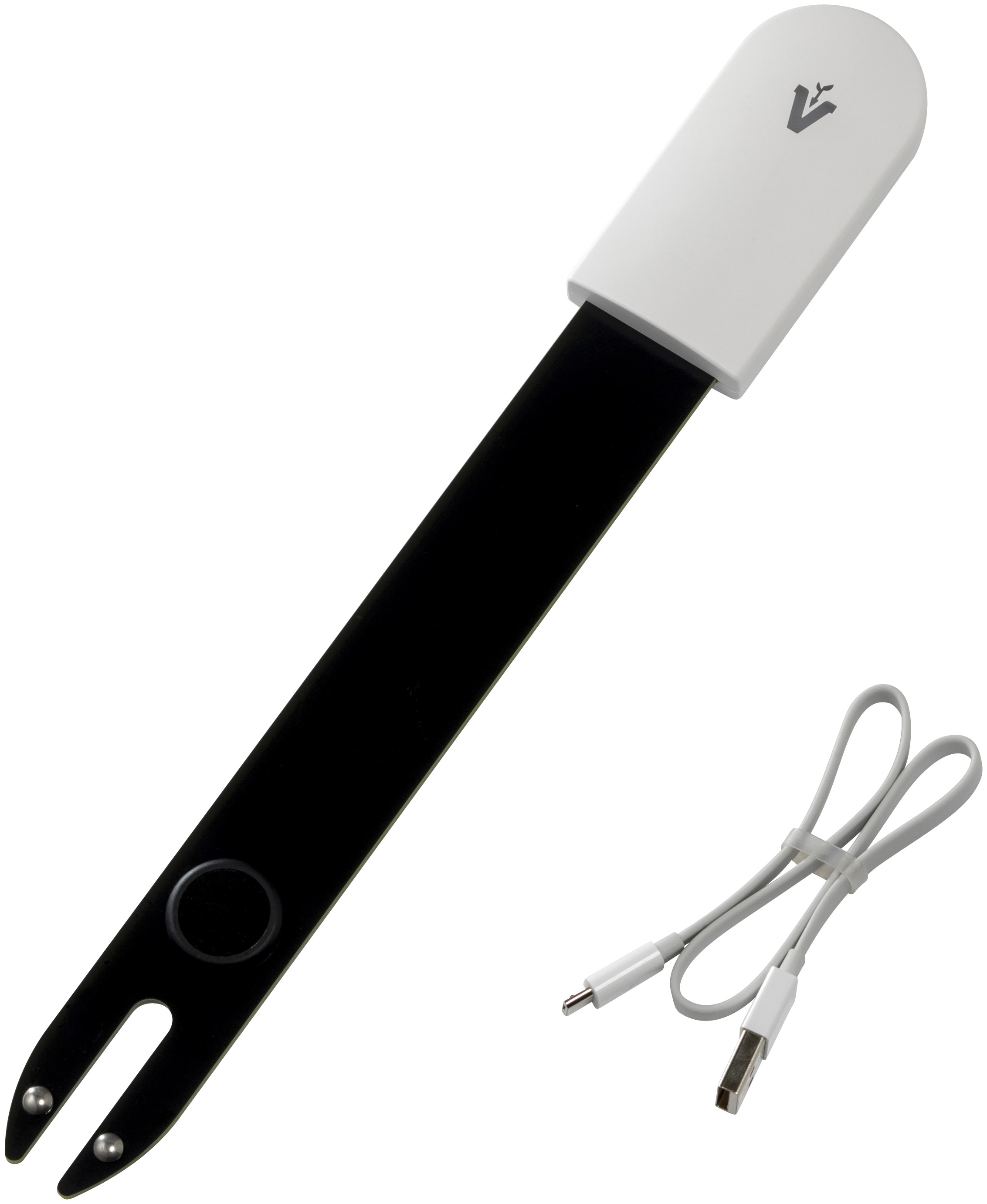
Configuration example:
sensor:
- platform: xiaomi_gcls002
mac_address: XX:XX:XX:XX:XX:XX
temperature:
name: "GCLS02 Temperature"
moisture:
name: "GCLS02 Moisture"
conductivity:
name: "GCLS02 Soil Conductivity"
illuminance:
name: "GCLS02 Illuminance"HHCCPOT002
FlowerPot, Huahuacaocao, RoPot, broadcasts moisture and conductivity

Configuration example:
sensor:
- platform: xiaomi_hhccpot002
mac_address: XX:XX:XX:XX:XX:XX
moisture:
name: "HHCCPOT002 Moisture"
conductivity:
name: "HHCCPOT002 Soil Conductivity"LYWSDCGQ
Hygro thermometer, round body, segment LCD, broadcasts temperature, humidity and battery level. This device is also known as MJ_HT_V1. In HA’s native Xiaomi BLE integration, the device info page shows it as “MJ_HT_V1 (LYWSDCGQ by Xiaomi)”.
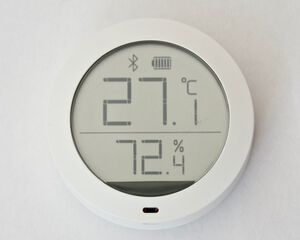
Configuration example:
sensor:
- platform: xiaomi_lywsdcgq
mac_address: XX:XX:XX:XX:XX:XX
temperature:
name: "LYWSDCGQ Temperature"
humidity:
name: "LYWSDCGQ Humidity"
battery_level:
name: "LYWSDCGQ Battery Level"LYWSD02
Hygro thermometer, rectangular body, e-ink display, broadcasts temperature, humidity and battery level.

- Battery Level, needs xiaomi firmware 1.1.2_0085
Configuration example:
sensor:
- platform: xiaomi_lywsd02
mac_address: XX:XX:XX:XX:XX:XX
temperature:
name: "LYWSD02 Temperature"
humidity:
name: "LYWSD02 Humidity"
battery_level:
name: "LYWSD02 Battery Level"LYWSD02MMC
Hygro thermometer, rectangular body, e-ink display, broadcasts temperature, humidity and battery level. Encrypted.
Configuration example:
sensor:
- platform: xiaomi_lywsd02mmc
mac_address: "A4:C1:38:54:5E:18"
bindkey: "2529d8e0d23150a588675cc54ad48400"
temperature:
name: "LYWSD02MMC Temperature"
humidity:
name: "LYWSD02MMC Humidity"
battery_level:
name: "LYWSD02MMC Battery Level"CGG1
Cleargrass (Qingping): hygro thermometer, round body, e-ink display.
New firmware requires a bindkey in order to decrypt the received data (see Obtaining the Bindkey), and stopped broadcasting battery level.

Configuration example:
sensor:
- platform: xiaomi_cgg1
mac_address: XX:XX:XX:XX:XX:XX
temperature:
name: "CGG1 Temperature"
humidity:
name: "CGG1 Humidity"
battery_level:
name: "CGG1 Battery Level"
- platform: xiaomi_cgg1
mac_address: XX:XX:XX:XX:XX:XX
bindkey: "00112233445566778899aabbccddeeff"
temperature:
name: "CGG1 (New) Temperature"
humidity:
name: "CGG1 (New) Humidity"LYWSD03MMC
Hygro thermometer, small square body, segment LCD, encrypted, broadcasts temperature, humidity and battery status.
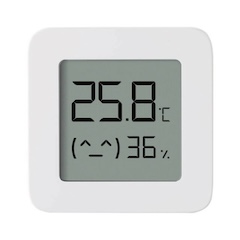
There are the following possibilities to operate this sensor:
- Xiaomi stock firmware (requires a bindkey in order to decrypt the received data, see Obtaining the Bindkey)
- Device flashed with PVVX MiThermometer custom firmware
- Device flashed with ATC MiThermometer custom firmware
- “Mi Like” advertisement (dummy bindkey required)
- “Custom” advertisement (no bindkey required)
- “pvvx” custom advertisement (no bindkey required, only PVVX firmware)
Configuration example for Xiaomi stock firmware or ATC MiThermometer firmware set to “Mi Like” advertisement:
sensor:
- platform: xiaomi_lywsd03mmc
mac_address: XX:XX:XX:XX:XX:XX
bindkey: "eef418daf699a0c188f3bfd17e4565d9"
temperature:
name: "LYWSD03MMC Temperature"
humidity:
name: "LYWSD03MMC Humidity"
battery_level:
name: "LYWSD03MMC Battery Level"Configuration example for PVVX MiThermometer firmware set to “Custom” advertisement:
sensor:
- platform: pvvx_mithermometer
mac_address: XX:XX:XX:XX:XX:XX
temperature:
name: "PVVX Temperature"
humidity:
name: "PVVX Humidity"
battery_level:
name: "PVVX Battery-Level"
battery_voltage:
name: "PVVX Battery-Voltage"
signal_strength:
name: "PVVX Signal"Configuration example for ATC MiThermometer firmware set to “Custom” advertisement:
sensor:
- platform: atc_mithermometer
mac_address: XX:XX:XX:XX:XX:XX
temperature:
name: "ATC Temperature"
humidity:
name: "ATC Humidity"
battery_level:
name: "ATC Battery-Level"
battery_voltage:
name: "ATC Battery-Voltage"
signal_strength:
name: "ATC Signal"XMWSDJ04MMC
Hygro thermometer, small square body, e-ink display, encrypted, broadcasts temperature, humidity and battery status. Requires a bindkey in order to decrypt the received data (see Obtaining the Bindkey).
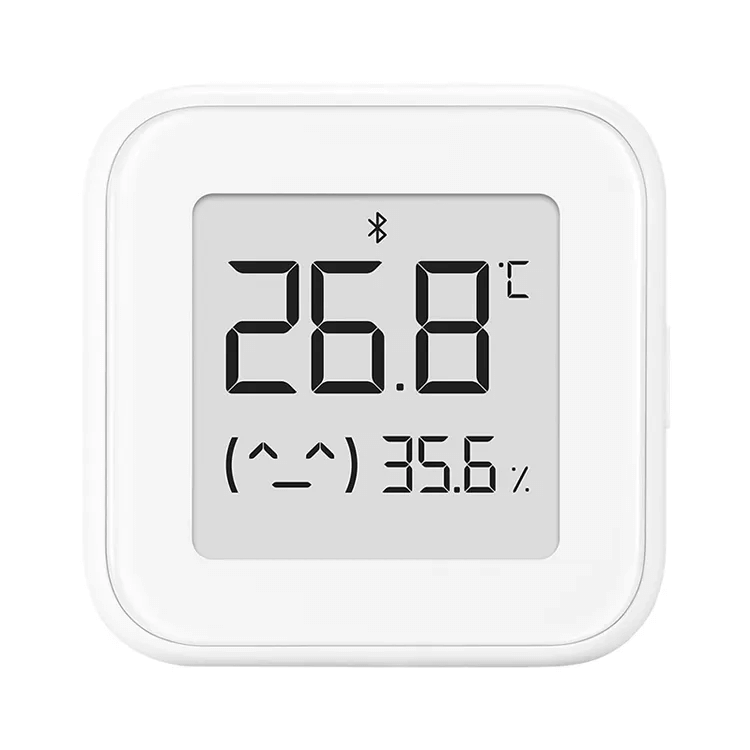
Configuration example:
sensor:
- platform: xiaomi_xmwsdj04mmc
mac_address: XX:XX:XX:XX:XX:XX
bindkey: "eef418daf699a0c188f3bfd17e4565d9"
temperature:
name: "XMWSDJ04MMC Temperature"
humidity:
name: "XMWSDJ04MMC Humidity"
battery_level:
name: "XMWSDJ04MMC Battery Level"MHO-C303
Hygro thermometer clock with alarm, rectangular body, e-ink display, broadcasts temperature, humidity and battery status. Not encrypted.

Similar to the LYWSD02, with additional clock features (alarm, pomodoro timer). Runs on two AAA batteries.
Configuration example:
sensor:
- platform: xiaomi_mhoc303
mac_address: XX:XX:XX:XX:XX:XX
temperature:
name: "MHO-C303 Climate Temperature"
humidity:
name: "MHO-C303 Climate Humidity"
battery_level:
name: "MHO-C303 Climate Battery Level"MHO-C401
Hygro thermometer, square body, e-ink display, encrypted, broadcasts temperature, humidity and battery status. Requires a bindkey in order to decrypt the received data (see Obtaining the Bindkey).
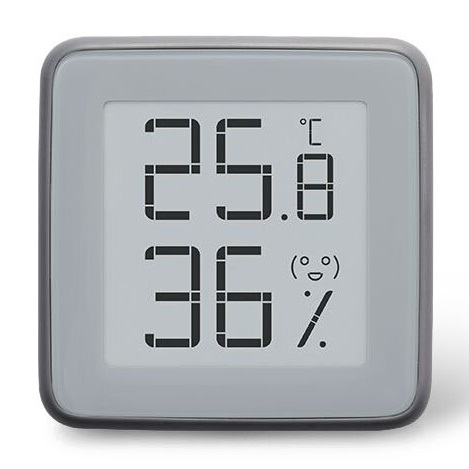
( MHO-C201 doesn’t have BT )
Similar to the LYWSD03MMC, there is custom firmware available for this device, so there are the following possibilities to operate this sensor:
- Xiaomi stock firmware (requires a bindkey in order to decrypt the received data, see Obtaining the Bindkey)
- Device flashed with PVVX MiThermometer custom firmware
- “Mi Like” advertisement (dummy bindkey required)
- “pvvx” custom advertisement (no bindkey required, only PVVX firmware)
Configuration example for Xiaomi stock firmware:
sensor:
- platform: xiaomi_mhoc401
mac_address: XX:XX:XX:XX:XX:XX
bindkey: "eef418daf699a0c188f3bfd17e4565d9"
temperature:
name: "MHOC401 Temperature"
humidity:
name: "MHOC401 Humidity"
battery_level:
name: "MHOC401 Battery Level"Configuration example for PVVX MiThermometer firmware set to “Custom” advertisement:
sensor:
- platform: pvvx_mithermometer
mac_address: XX:XX:XX:XX:XX:XX
temperature:
name: "PVVX Temperature"
humidity:
name: "PVVX Humidity"
battery_level:
name: "PVVX Battery-Level"
battery_voltage:
name: "PVVX Battery-Voltage"CGD1
Cleargrass (Qingping) alarm clock, segment LCD, encrypted, broadcasts temperature, humidity and battery status. Requires a bindkey in order to decrypt the received data (see Obtaining the Bindkey).
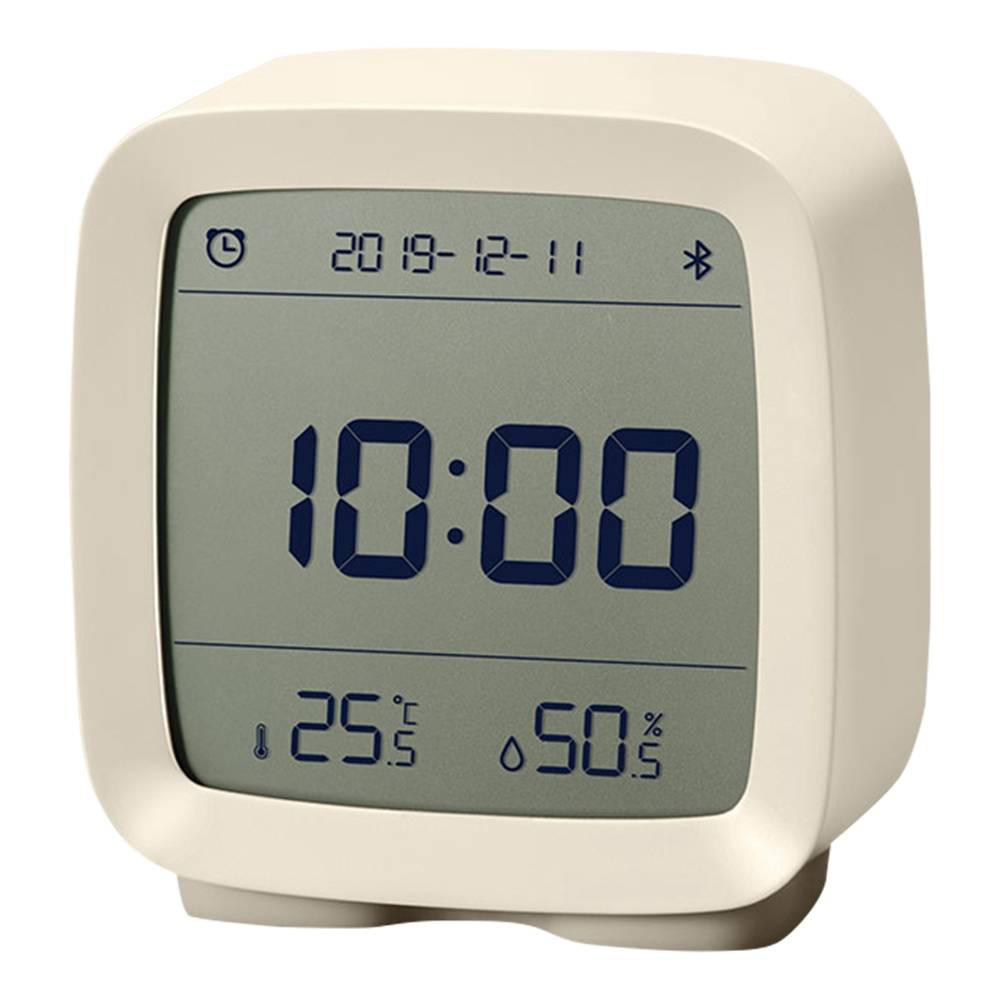
Configuration example:
sensor:
- platform: xiaomi_cgd1
mac_address: XX:XX:XX:XX:XX:XX
bindkey: "fe39106baeedb7c801e3d63c4396f97e"
temperature:
name: "CGD1 Temperature"
humidity:
name: "CGD1 Humidity"
battery_level:
name: "CGD1 Battery Level"CGDK2
Cleargrass (Qingping) Temp & RH Lite, round body, segment LCD, encrypted, broadcasts temperature, humidity and battery status. Requires a bindkey in order to decrypt the received data (see Obtaining the Bindkey). The measurements are broadcast every 10-15 minutes.
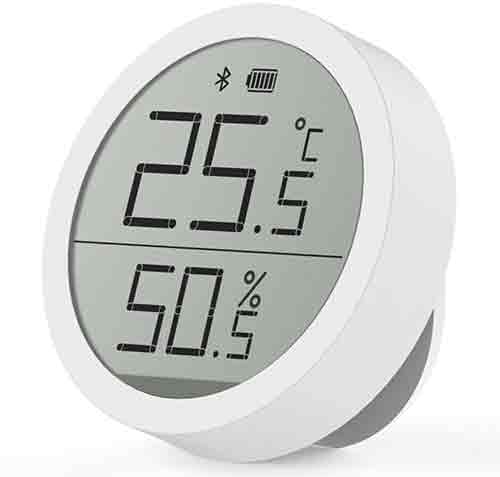
Configuration example:
sensor:
- platform: xiaomi_cgdk2
mac_address: XX:XX:XX:XX:XX:XX
bindkey: "fe39106baeedb7c801e3d63c4396f97e"
temperature:
name: "CGDK2 Temperature"
humidity:
name: "CGDK2 Humidity"
battery_level:
name: "CGDK2 Battery Level"JQJCY01YM
Xiaomi (Honeywell) formaldehyde sensor, OLED display, broadcasts temperature, humidity, formaldehyde concentration (mg/m³) and battery status.
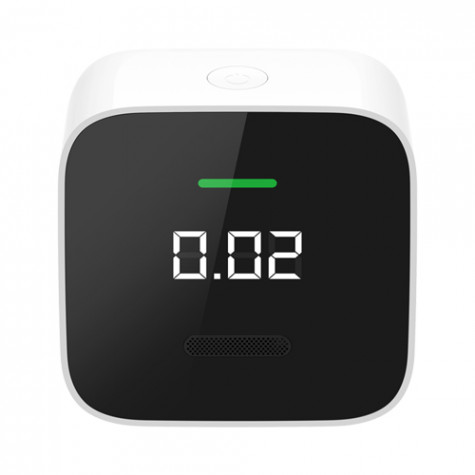
Configuration example:
sensor:
- platform: xiaomi_jqjcy01ym
mac_address: XX:XX:XX:XX:XX:XX
temperature:
name: "JQJCY01YM Temperature"
humidity:
name: "JQJCY01YM Humidity"
formaldehyde:
name: "JQJCY01YM Formaldehyde"
battery_level:
name: "JQJCY01YM Battery Level"WX08ZM
Mosquito Repellent Smart Version, broadcasts the tablet resource level, on/off state and battery level, implemented as a hybrid sensor, needs both sensor and binary_sensor in config.
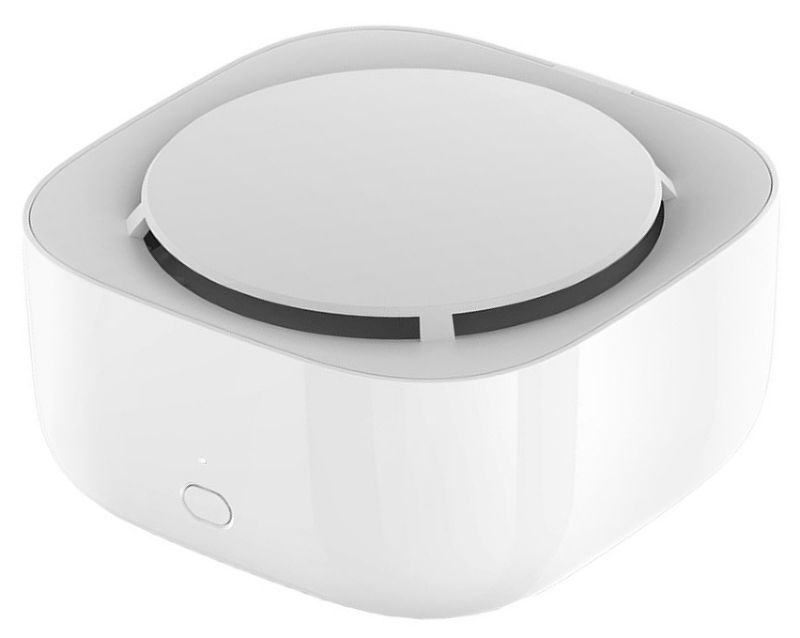
Configuration example:
sensor:
binary_sensor:
- platform: xiaomi_wx08zm
mac_address: XX:XX:XX:XX:XX:XX
tablet:
name: "WX08ZM Mosquito Tablet"
battery_level:
name: "WX08ZM Battery Level"MUE4094RT
Xiaomi Philips BLE night light, broadcasts motion detection (detected/clear, on/off), default timeout is 5s, implemented as a hybrid sensor, needs both sensor and binary_sensor in config.

Configuration example:
sensor:
binary_sensor:
- platform: xiaomi_mue4094rt
name: "MUE4094RT Night Light"
mac_address: XX:XX:XX:XX:XX:XX
timeout: "5s"MJYD02YL-A
Xiaomi Yeelight night light, in-shape replacement of MJYD02YL with BLE, broadcasts light on/off status, motion detection, idle time since last motion event and battery status. Requires a bindkey in order to decrypt the received data (see Obtaining the Bindkey). Implemented as a hybrid sensor, needs both sensor and binary_sensor in config.
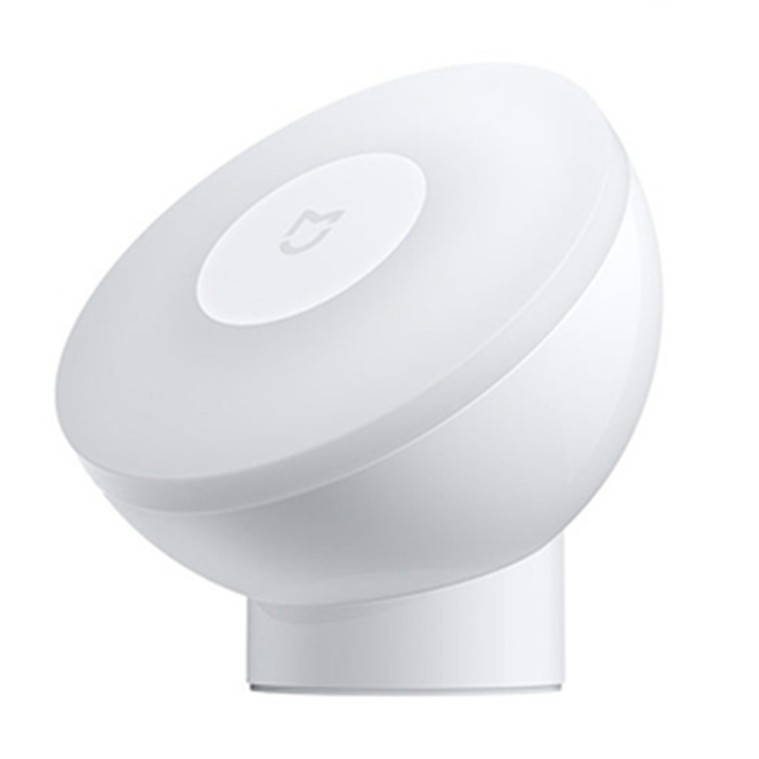
Configuration example:
sensor:
binary_sensor:
- platform: xiaomi_mjyd02yla
name: "MJYD02YL-A Night Light"
mac_address: XX:XX:XX:XX:XX:XX
bindkey: "48403ebe2d385db8d0c187f81e62cb64"
idle_time:
name: "MJYD02YL-A Idle Time"
light:
name: "MJYD02YL-A Light Status"
battery_level:
name: "MJYD02YL-A Battery Level"
illuminance:
name: "MJYD02YL-A Illuminance"CGPR1
Qingping motion & ambient light sensor. Broadcasts motion detection, idle time since last motion event, lux value and battery status. Requires a bindkey in order to decrypt the received data (see Obtaining the Bindkey).
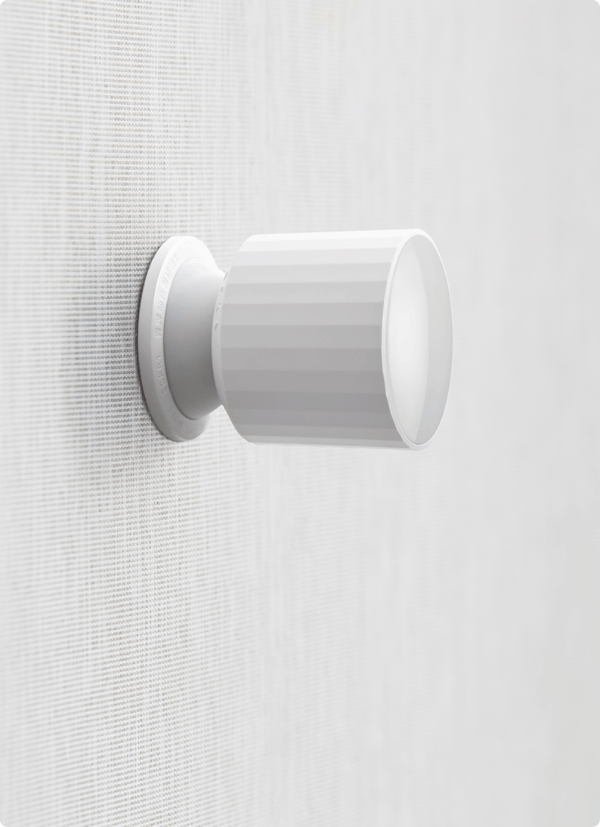
Configuration example:
binary_sensor:
- platform: xiaomi_cgpr1
name: "CGPR1 Motion detector"
mac_address: XX:XX:XX:XX:XX:XX
bindkey: "ff1ae526b23b4aebeadcaaad86f59055"
idle_time:
name: "CGPR1 Idle Time"
battery_level:
name: "CGPR1 Battery Level"
illuminance:
name: "CGPR1 Illuminance"RTCGQ02LM - Mi Motion Sensor 2
Motion & ambient light sensor. Broadcasts motion detection, light/dark and battery status. Also has a button that broadcasts when pressed. Requires a bindkey in order to decrypt the received data (see Obtaining the Bindkey).
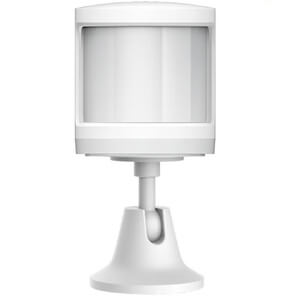
Configuration example:
xiaomi_rtcgq02lm:
- id: motion_one
mac_address: XX:XX:XX:XX:XX:XX
bindkey: fe39106baeedb7c801e3d63c4396f97e
binary_sensor:
- platform: xiaomi_rtcgq02lm
id: motion_one
motion:
name: "Mi Motion"
light:
name: "Mi Motion Sensor Light"
button:
name: "Mi Motion Sensor Button"
sensor:
- platform: xiaomi_rtcgq02lm
id: motion_one
battery_level:
name: "Mi Motion Sensor Battery Level"Setting Up Devices
Required:
- mac_address (MAC Address): The MAC address of the device.
- bindkey (string, 32 characters, case insensitive): The key to decrypt the BLE advertisements for encrypted sensor types
All options from Sensor are supported for:
- temperature
- humidity
- moisture
- illuminance
- conductivity
- tablet
- formaldehyde
- battery_level
Obtaining the MAC address
To find the MAC Address so that ESPHome can identify the device, you can create a simple configuration without any sensor entries:
esp32_ble_tracker:
xiaomi_ble:After uploading, the ESP32 will immediately try to scan for BLE devices. When it detects a new sensor, it will automatically parse the BLE message print a message like this one:
Found device XX:XX:XX:XX:XX:XX RSSI=-78
Address Type: PUBLIC
Name: 'LYWSD03MMC'It can sometimes take some time for the first BLE broadcast to be received. Once the device has been found, copy the address XX:XX:XX:XX:XX:XX into a new platform entry like shown in the example configurations.
Obtaining the Bindkey
To set up an encrypted device such as the LYWSD03MMC (with Xiaomi stock firmware) and CGD1, you first need to obtain the bind key. The xiaomi_ble sensor component is not able to automatically generate a bindkey so other workarounds are necessary.
LYWSD03MMC/MHO-C401
If the LYWSD03MMC or MHO-C401 sensor is operated with the Xiaomi stock firmware, you can use the TeLink flasher application to easily generate a new bind key and upload the key to the device without the need to flash a new firmware (see figure). For this, you load the flasher webpage with a supported browser and connect the device by pressing “Connect”. After the connection is established, you press the “Do Activation” button and the new key will be shown in the “Mi Bind Key” field. The key can be copied directly into the sensor YAML configuration.
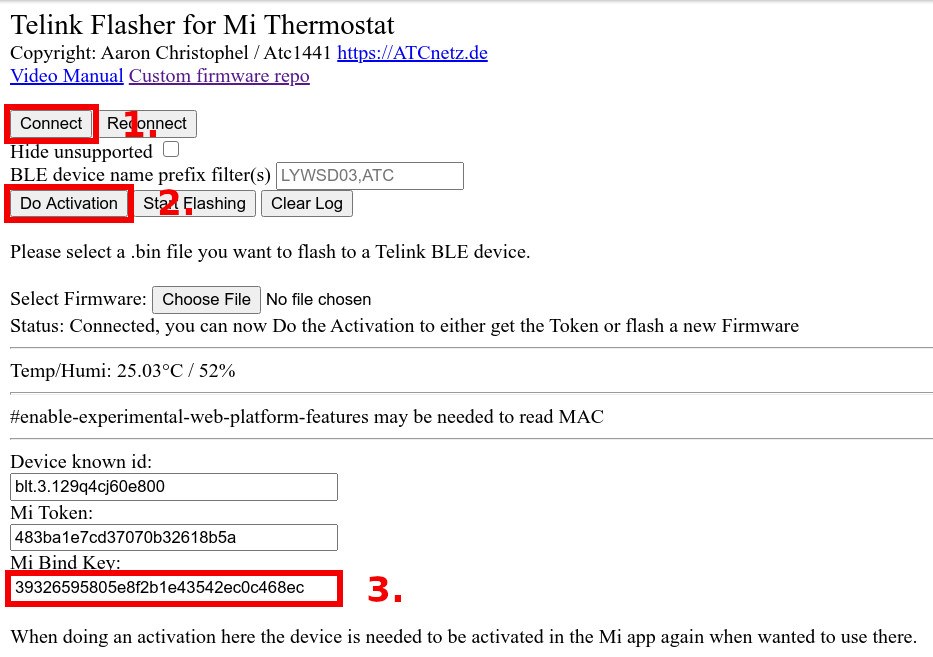
⚠️ Warning
The new bind key will work with ESPHome, but the Mi Home app will not recognise the sensor anymore once the device has been activated by the TeLink flasher application. To use the sensor again with the Xiaomi Mi Home app, the device needs to be removed and then re-added inside the Mi Home app.
CGDK2
The method to obtain a new bind key for the CGDK2 sensor is similar to the method for the LYWSD03MMC sensor, except a modified version of the flasher application is used.
For this, you load the application with a supported browser and connect the device by pressing “Connect”. After the connection is established, you press the “Do Activation” button and the new key will be shown in the “Mi Bind Key” field. The key can be copied directly into the sensor YAML configuration.
Other encrypted devices
The easiest method (confirmed to work for LYWSD03MMC) is to use the Telink flasher method. The accompanying video shows how to wirelessly flash a LYWSD03MMC, or how to obtain the bind key of the stock firmware (watch till around 13:10). The custom firmware allows you to change several settings of the device, including the smiley and the advertising interval. Follow the instructions on the site using Telink Flasher - best results with a Bluetooth-enabled Android phone. Note that with
pvvxdefault settings advertisment is set toCustomwith no encryption. No need forbind_keyin this case, you can just add the sensors to your ESPHome config as described above.The other option is to use the original Mi Home app to add the sensor once. While adding the device, a new key is generated and uploaded into the Xiaomi cloud and to the device itself. Currently a chinese server needs to be selected as the rest of the world doesn’t support most of these devices yet. Once generated, the key will not change again until the device is removed and re-added in the Xiaomi app.
The easiest method to retrieve the bindkey from the cloud is to use the Cloud Tokens Extractor, written by one of Home Assistant users. If you prefer to not use the executable, read the Home Assistant Documentation.
Another option is to use a SSL packet sniffer. It can be setup on either an Android phone or the iPhone. Instructions how to obtain the key using Android can be found in in this tutorial on GitHub. Instructions how to obtain the key using an iPhone can be found in custom-components/sensor.mitemp_bt on GitHub. Once the traffic between the Mi Home app and the Xiaomi servers has been recorded, the bind key will show in clear text:
packet: POST /app/device/bltbind "data" = "{"did":"blt.3.129q4nasgeg00","token":"20c665a7ff82a5bfb5eefc36","props":[{"type":"prop","key":"bind_key","value":"cfc7cc892f4e32f7a733086cf3443cb0"}, {"type":"prop","key":"smac","value":XX:XX:XX:XX:XX:XX}]}"The
bind_keyis the 32 digits “value” item in the above output which needs to be inserted into the config file.
Improving reception performance
Use a board with an Ethernet connection to the network, to offload ESP32’s radio module from WiFi traffic, this gains performance on Bluetooth side.
To maximize the chances of catching advertisements of the sensors, you can set interval equal to window in ESP32 Bluetooth Low Energy Tracker Hub scan parameter settings:
esp32_ble_tracker:
scan_parameters:
interval: 5s # try with 300ms if you don't have LAN module
window: 5s # try with 300ms if you don't have LAN module
active: falseAvoid placing the ESP node in racks, close to routers/switches or other network equipment as EMI interference will degrade Bluetooth signal reception. For best results put as far away as possible, at least 3 meters distance from any other such equipment.
Security considerations
You should at least protect your sensors with a custom pairing PIN code. Choose a method employing bindkey in order to use encrypted communication over the air.

